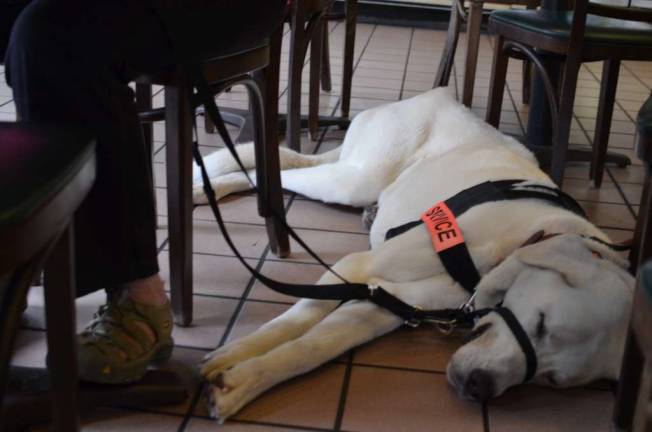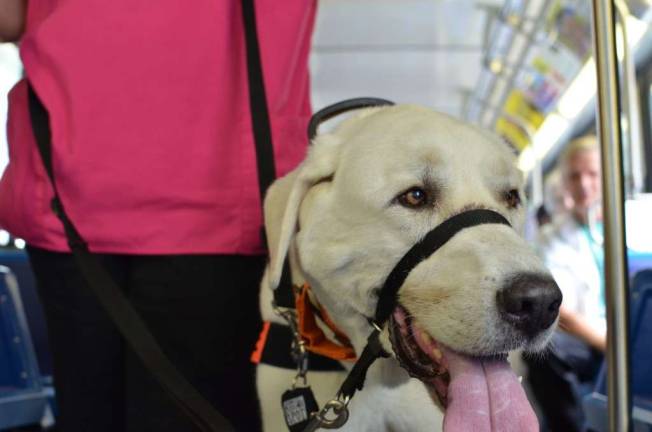Service Dog Users Find Varying Degrees of Access


Some file complaints while others believe increased awareness will improve conditions
After three calls to the manager, the restaurant still refused to serve Peter Slatin.
Legally blind, Slatin, 58, recently went to dinner with his service dog and a friend on the Upper West Side. He said he's never had trouble on the bus or subway, but in restaurants his experiences have been varied.
"Usually the challenge comes from a host or a hostess who is unaware of the law and says 'you can't bring a dog in here,'" he said. When that happens, Slatin typically tells them that he uses a service dog and it's against the law to refuse to serve him.
"Usually it's resolved when the server contacts the manager and the manager checks the law somehow or calls a superior, eventually it goes up the chain of command," said Slatin. "I stick around and prevail and get them to know the law."
This time however, despite explaining the law to employees, he was still turned away because of the presence of the dog. "It's very frustrating and annoying," said Slatin, of having to explain the law to business owners and their employees. It's especially frustrating when even that doesn't work.
Slatin said he decided not to file a complaint against the restaurant, but he thinks the complaint process with the city's Human Rights Commission is meaningful.
"I believe the incident at [the restaurant] was sufficient to require the management to check the regulations," said Slatin. "I'm not going to go back there and test them, I don't care."
He said he cares that the restaurant knows the law - which he believes they do after he was refused service - but does not wish to see them punished for discriminating against him.
Slatin is not alone but just how many New Yorkers use service animals is difficult to determine.
Cissy Stamm, 68, who lives in the Lower East Side and uses a service dog to help her manage post traumatic stress disorder for sexual abuse she endured as a child. Last week she entered a Chinese buffet near 8th Avenue and 14th Street with her service dog and had to repeatedly argue her case before she was allowed to stay. The employees were unsure of the law and didn't want to get in trouble with their boss.
"That was relatively normal," said Stamm, of the experience. "It makes you feel very unwelcome, you're treated differently than other customers are treated and...you have to argue for your right to be served."
Stamm said these days she rarely has issues on public transportation, but restaurants sometimes pose a challenge. She believes there simply isn't enough education for business owners and employees on complying with the Americans with
Disabilities Act.
Under the ADA, service animals are defined as dogs "that are individually trained to do work or perform tasks for people with disabilities." This can include guiding people who are blind, alerting people who are deaf, pulling a wheelchair, alerting and protecting a person who is having a seizure, reminding a person with mental illness to take prescribed medications or calming a person with PTSD during an anxiety attack. The guiding benchmark of the law is that a service animal's work must be directly related to the user's disability.
The law also says that "state and local governments, businesses, and nonprofit organizations that serve the public generally must allow service animals to accompany people with disabilities in all areas of the facility where the public
is normally allowed to go."
Another obstacle for those who use service dogs are the particulars of the ADA itself. For instance, a 2011 update to the ADA clarifies that emotional support dogs are not classified as service animals because they don't have the same
level of specialized training that a service dog must have. This graduated proficiency training acclimates service dogs to crowds and teaches them to abstain from typical dog behaviors; sniffing food, barking, hyperactivity and socialization.
These differences, along with other laws like the Fair Housing Act and the Air Carrier Access Act that can come into play, are cause for confusion for everyone involved in matters of public access. The differing perceptions that business
owners, their employees and public transit workers have of these laws all combine to create a public access game of roulette for people with disabilities, especially in urban centers like New York City.
Stamm has fought public access battles - like the relatively mild one at the Chinese buffet - since 1997, when she first began using a service dog. She has successfully sued the transit police and has a lawsuit currently pending against
the city and the bus authority, based on 55 access violations she's dealt with. She believes even though the latest suit hasn't yet come to a resolution, its existence may have changed the city's public transit access policies for people
with disabilities.
She fights back in other ways too, co-founding NY Area Service Dogs, an organization that provides education for people who need service dogs and businesses looking for information on service animal guidelines. The organization also advocates on behalf of people with disabilities or who need emotional support dogs.
Slatin feels that it's the responsibility of the restaurant owner to make sure that employees are trained to work with people who have disabilities, and that sometimes restaurant owners fall short.
"It's very hit or miss," said Slatin, on whether he regularly runs into problems At restaurants. "There's no rhyme or reason...it's generally ignorance and it's rarely hostility."
The most difficulty Slatin has in connection with his disability is hailing taxis, which pass him by when they see he is blind and has a service dog; a German Shepherd that weighs about 70 pounds. "A lot of taxis pass me by - a
lot," said Slatin. "And people tell me that all the time."
A year ago, he started a business consulting with the hospitality industry to train employees on working with guests who have all manner of disabilities. He said he started The Slatin Group because of the cumulative weight of bad experiences he's had trying to get service.
However, he thinks conditions are better than they used to be. The population is aging, he said, and millennials - including veterans - are much more tech-savvy and less likely to let their disabilities get in the way of their lives. These conditions all further the cause of equal access for those with disabilities, said Slatin.
Stamm fights for equal access through education and by filing complaints with the city's Human Rights Commission. People with disabilities who use service dogs are "still not in a place where we can expect the same kind of treatment as
people who do not have disabilities and are not equipped with service dogs," said Stamm. "It really is humiliating."